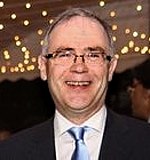Governor of Bermuda
| Governor of Bermuda | |
|---|---|

Coat of Arms of Bermuda
|
|
| Viceroy | |
| Style | His Excellency |
| Residence | Government House |
| Appointer | Monarch of the United Kingdom |
| Term length | At His/Her Majesty's pleasure |
| Formation | 1612 |
| First holder | Richard Moore |
| Website | Office of the Governor |
The Governor of Bermuda is the representative of the British monarch in the British overseas territory of Bermuda. The Governor is appointed by the monarch on the advice of the British government. The role of the Governor is to act as the de facto head of state, and he or she is responsible for appointing the Premier and the 11 members of the Senate (the upper house of Bermuda's Parliament).
The current Governor is John Rankin; he was sworn in on 5 December 2016.
The Governor has his own flag in Bermuda, a Union Flag defaced with the territory's coat of arms.
Bermuda's settlement began in 1609, with the wrecking of the flagship of the Virginia Company, the Sea Venture. Although most of the passengers and crew ultimately completed their voyage to Virginia, the archipelago was permanently settled from that point, and left in the hands of the Virginia Company. The first intentional settlers arrived in 1612, under the colony's first Governor, Richard Moore. A carpenter by trade, Moore ensured the long-term survival of the colony by concentrating on building fortifications, including the first stone forts in the English New World, and developing St. George's Town.
Bermuda was the second permanent English colony established (as an extension of the first, Jamestown, Virginia). Bermuda was administered under Royal charters by the Virginia Company, and its successor, the Somers Isles Company, which appointed the colony's governors until the Crown revoked the charter and took over administration in 1684. The Crown maintained the system of government established under the company; an elected parliament and a privy council under a governor. The Privy Council, made up of the Chief Justice, certain senior civil servants, and appointees, was also known as the Governor's Council and the Legislative Council (most of its responsibilities are now filled by the Cabinet and the Senate of Bermuda, with the Council now only an advisory body for the Governor). The last company-appointed Governor was reappointed by the Crown. In 1707 the British State was created by the union of the Kingdom of England with the Kingdom of Scotland, and Bermuda thereby became a British colony. Since the 1783 independence of Virginia, it has been the Britain's oldest colony. Following US independence, Bermuda became an important Royal Navy base, with a large military garrison to guard it. As such, the policy of the government until the closure of the Royal Naval dockyard in 1953 had been to appoint retiring Generals or Admirals as Bermuda's Governor and Commander-in-Chief. On the rare occasions when a civilian was appointed to the role, it was only as Governor – the role of Commander-in-Chief being filled by a serving General or Admiral in Bermuda or Newfoundland. Since the 1950s, those appointed Governor and Commander-in-Chief have tended to be prominent career-politicians at the ends of their political lives.
...
Wikipedia

